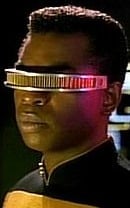 Remember Geordi La Forge? He's the fictional character in Star Trek: The Next Generation who was portrayed by LeVar Burton. Blind from birth, the helmsman of the USS Enterprise-D wore a "VISOR" (Visual Instrument and Sensory Organ Replacement) in order to "see."
Remember Geordi La Forge? He's the fictional character in Star Trek: The Next Generation who was portrayed by LeVar Burton. Blind from birth, the helmsman of the USS Enterprise-D wore a "VISOR" (Visual Instrument and Sensory Organ Replacement) in order to "see."
Some have compared the fictional character's wearable high tech device to Google's wearable computing device, Glass. OK, maybe it's a bit of stretch, but the connection has been made frequently enough that Washington Post Tech Reporter Hayley Tsukayama asked Burton in a wide ranging interview what he thought about Glass. Here's the headline on Tsukayma's report: LeVar Burton on ‘Reading Rainbow,’ the future of ‘Star Trek’ and why Google Glass freaks him out.
Before he was on Star Trek, Buton hosted the PBS show, Reading Rainbow. He's now got a company RRKidz that is trying to bring back the core of the reading program for the digital age, using a tablet app.
"As sort of the original man with the wearable tech, what do you see as the potential of wearable tech and Google Glass?" asked Tsukayama. Burton's response:
I’m a big fan of technology of all sorts. And I’ve been surprised at my own reaction to wearable tech, certainly where Glass is concerned. I was very excited about Google Glass, certainly very interested in it. And then when I encountered it for the first time, my first question was, “Well, are you recording me?”
So the issue of discernment and privacy comes up for me. And I just believe that we will need to do a much better job of being transparent, no pun intended, in how we interface with these technologies before they reach critical mass. I believe there’s just way too much skepticism still. And the first adopters are really taking the brunt for all of us in terms of being the first wave of those who are getting this first response that, certainly, surprised me. As much a fan as I am of technology, my first reaction was one of self-preservation.
I couldn't agree more with Burton. The Internet giant's wearable computing device, raises tremendous privacy issues.
Just after I read Tsukayama's article, I found this piece, How Google Glass set wearable computing back 10 years, by Network World's Frederic Paul.
"Clearly, something went horribly wrong, " he writes. "The technology is partly to blame. It turns out that Google Glass doesn’t actually do all that much. It takes mediocre photos and videos. It offers slow, balky, and low-res access to some websites and online services. And that’s kind of about it."
Here's Paul analysis of howGoogle managed to make Glass, what he cals "the coolest new technology idea in decades," into a complete laughingstock:
But the technology is not the real problem. The real problem is that Google did just about everything wrong in trying to market the devices:
1. It allowed only software developers—not usually the most socially advanced group—to buy the devices at first. The goal was to get the developers to create cool new apps for the device, but it ensured that the things would show up on the faces of the stereotypical nerds before anyone else. Glass quickly became a very expensive pocket protector.
2. Google gave Glass users a dorky, pretentious name—Glass Explorers—that only deepened the creepy social awkwardness.
3. Google didn’t start dealing with the social and fashion implications of putting a computing device on your face until far too late.
4. Google still hasn’t come up with a clear reason to wear the device in public. Is wearing Glass supposed to be fun? Is it supposed to make you smarter? Help you get ahead in business? Or what?But here’s the biggest issue. It seems Google spent a lot of time thinking about what Glass buyers might do with their fancy visors, but barely a glimmer about Glass’s impact on the people around the Glasshole.
 And that's precisely the point. If you design a product that is a stalker's dream-come-true, of course there will be pushback.
And that's precisely the point. If you design a product that is a stalker's dream-come-true, of course there will be pushback.
"While Glass is forever tainted, a better product, marketed the right way, could have been awesome. Imagine what Steve Jobs could have done with this concept, for example," Paul concludes. "But given Google’s epic marketing fail, it’s going to take a long, long time before even a much better product can overcome the stigma that now surrounds Google Glass."









